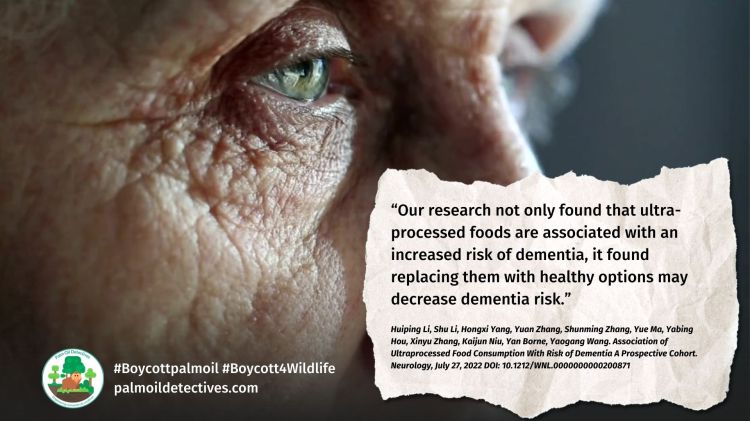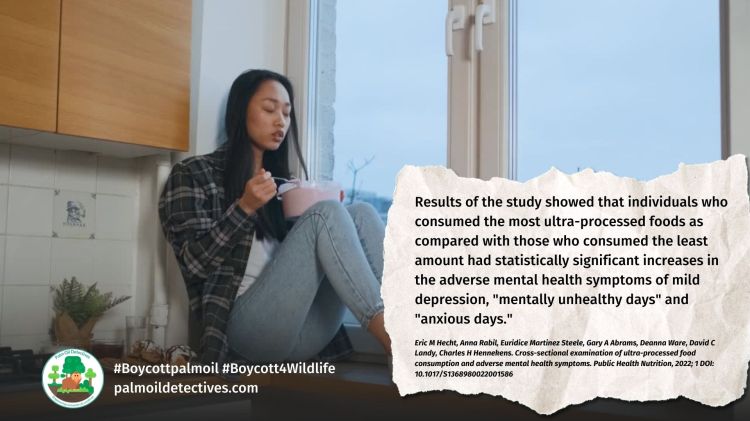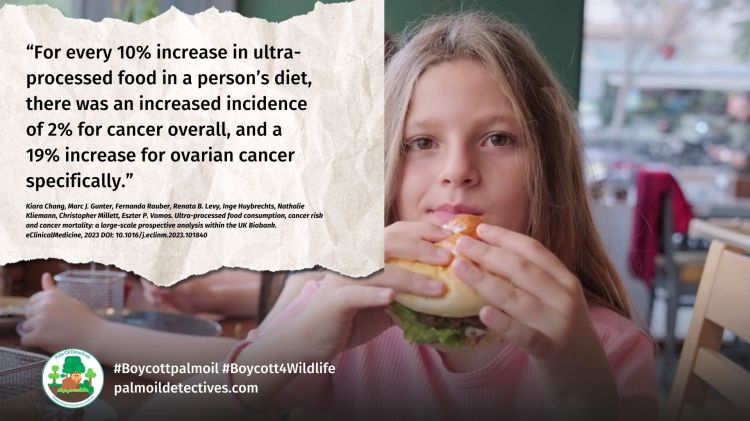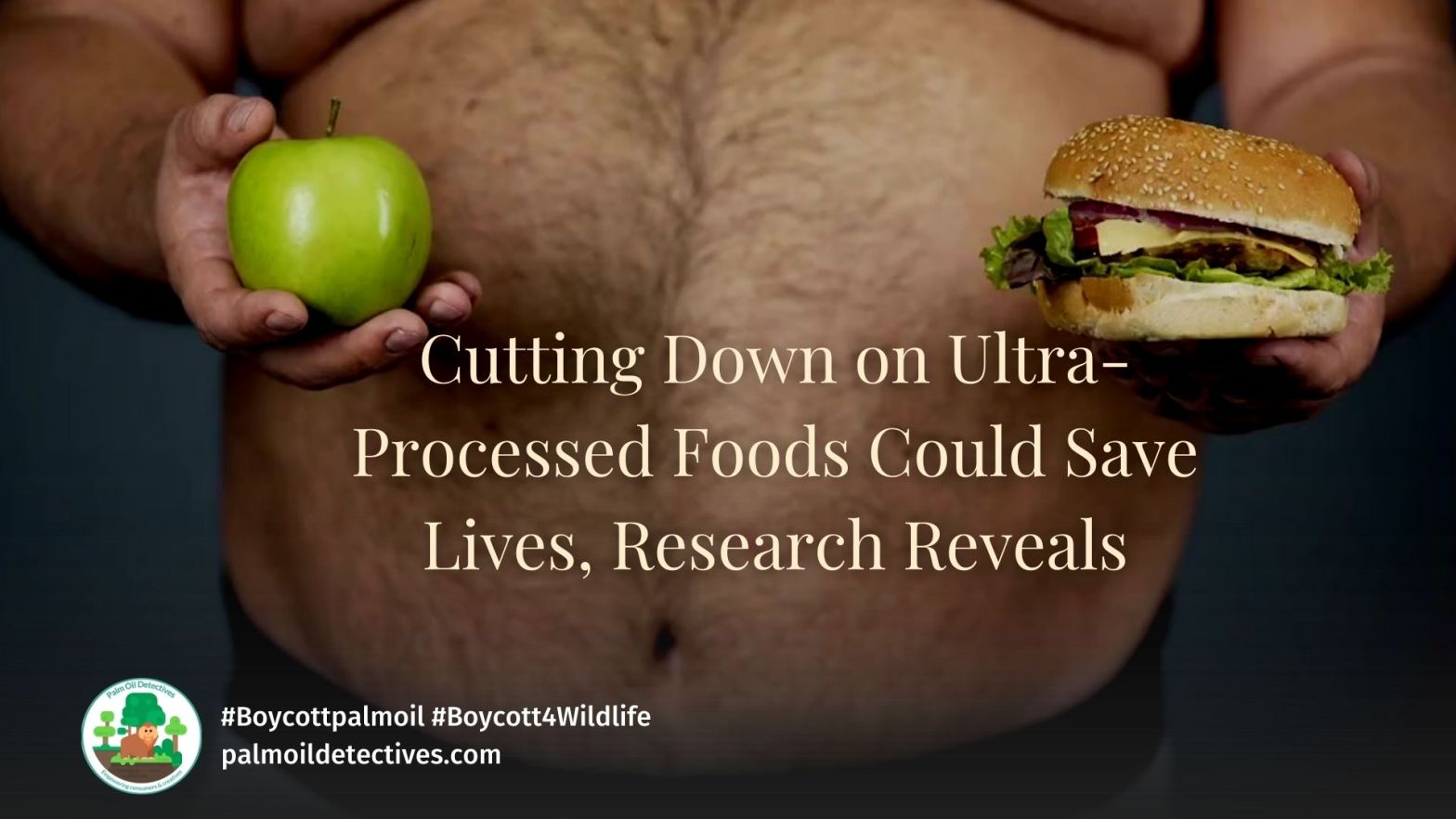
Recently, the CEO of breakfast giant Kelloggs Gary Pilnick promoted the benefits eating breakfast cereal for dinner as a way for people to cope with the increased cost of living and food:
“Cereal for dinner is something that is probably more on trend now, and we would expect [it] to continue as that consumer is under pressure,” Pilnick told CNBC about his stable of ultra-processed foods like Fruity Loops, Special K, and Frosted Flakes. He takes home a 4 million USD salary each year.
Many research studies released in the past decade have shown a clear link between the consumption of ultra-processed foods: [high sugar and high fat convenience foods, sugary breakfast cereals, processed baked goods and biscuits] with all of the biggest diseases that kill the most people: ischaemic heart disease, stroke, diabetes, obesity, dementia and many cancers.
Palm oil is a saturated fat that is present in many ultra-processed foods. Multiple studies including one by the World Health Organisation have linked palm oil consumption to increased mortality from heart disease and stroke. The UK’s National Health Service, Columbia Irving Medical Centre and others warn people against consuming palm oil due to its serious health risks.
The good news is, you can swap ultra-processed foods for whole foods in a way that is both healthier for you and budget-friendly. Read on to find out how.
Ultra-processed #foods are linked to #dementia #cancer #depression stroke and #heart disease. #Palmoil is a saturated fat implicated in many of these same #health risks. Learn more and #Boycottpalmoil in the supermarket, choose wholefoods @palmoildetect https://wp.me/pcFhgU-7hk
Did you know ultra processed foods (around 50% of all supermarket food) are linked to #stroke #heart disease, obesity, #dementia and #mentalhealth problems. Stay #healthy by avoiding #palmoil and other processed #food #Boycottpalmoil @palmoildetect https://wp.me/pcFhgU-7hk
Read more below about why convenience food is
What are ultra-processed foods? Ultra-processed foods are convenient, low cost, quick to prepare or ready-to-eat. They are industrial formulations that include substances (oils, fats, sugars, starch, protein isolates). These foods result from extensive physical, biological, and chemical processes that create food products that are deficient in natural nutrients. Typically, ultra-processed foods include flavourings, colourings, preservatives and emulsifiers. Read on to find out how to replace these ingredients.
Could ultra-processed foods be the new ‘silent’ killer?
Study by Florida Atlantic University finds that hundreds of novel ingredients never encountered by human physiology are now found in nearly 60 percent of the average adult’s diet and nearly 70 percent of children’s diets in the U.S. An emerging health hazard is the unprecedented consumption of these ultra-processed foods in the standard American diet. This may be the new ‘silent’ killer, as was unrecognized high blood pressure in previous decades. Physicians provide important insights in a battle where the entertainment industry, the food industry and public policy do not align with their patients’ needs.

Hundreds of novel ingredients never encountered by human physiology are now found in nearly 60 percent of the average adult’s diet and nearly 70 percent of children’s diets in the United States.
While obesity and lack of physical activity are well recognized contributors to avoidable morbidity and mortality in the U.S., another emerging hazard is the unprecedented consumption of these ultra-processed foods in the standard American diet. This may be the new “silent” killer, as was unrecognized high blood pressure in previous decades.
Physicians from Florida Atlantic University’s Schmidt College of Medicine explored this hypothesis and provide important insights to health care providers in a battle where the entertainment industry, the food industry and public policy do not align with their patients’ needs. Their findings are published in a commentary in The American Journal of Medicine.
“Those of us practicing medicine in the U.S. today find ourselves in an ignominious and unique position — we are the first cohort of health care professionals to have presided over a decline in life expectancy in 100 years,” said Dawn H. Sherling, M.D., corresponding author, associate program director for the internal medicine residency and an associate professor of medicine, FAU Schmidt College of Medicine.
“Our life expectancy is lower than other economically comparable countries. When we look at increasing rates of non-communicable diseases in less developed nations, we can see a tracking of this increase along with increasing consumption of ultra-processed foods in their diets.”
Although professional organizations such as the American College of Cardiology cautions patients to “choose minimally processed foods instead of ultra-processed foods” in their 2021 dietary guidelines, there is a caveat that “there is no commonly accepted definition for ultra-processed foods, and some healthy foods may exist within the ultra-processed food category.”
“When the components of a food are contained within a natural, whole food matrix, they are digested more slowly and more inefficiently, resulting in less calorie extraction, lower glycemic loads in general, and lower rise in triglyceride-rich lipoproteins after eating, which could result in atherosclerotic plaque,” said Allison H. Ferris, M.D., senior author, an associate professor and chair, Department of Medicine, and director of the internal medicine residency program, FAU Schmidt College of Medicine. “Therefore, even if the troublesome additives were removed from the ultra-processed food, there would still be concern for an over-consumption of these products possibly leading to obesity, diabetes and heart disease.”
The authors add that public health organizations are increasingly making use of the NOVA classification system, which divides foods into four categories — whole foods, culinary ingredients (items like butter, oil and salt), traditionally processed foods (such as bread and yogurt made with few ingredients), and ultra-processed foods — or those foods that are industrially made and use ingredients not normally found in a domestic kitchen.
According to the authors, one plausible mechanism to explain the hazards is that ultra-processed foods contain emulsifiers and other additives that the mammalian gastrointestinal tract mostly does not digest. They may act as a food source for our microbiota, and as such may be creating a dysbiotic microbiome that can, in the right host, promote disease.
“Additives, such as maltodextrin, may promote a mucous layer that is friendly to certain species of bacteria that are found in greater abundance in patients with inflammatory bowel disease,” said Sherling. “When the mucous layer is not properly maintained, the epithelial cell layer may become vulnerable to injury, as has been shown in feeding studies using carrageenan in humans and other studies in mice models, using polysorbate-80 and cellulose gum, triggering immunologic responses in the host.”
The authors add that there have been marked increases in colorectal cancer in the U.S., especially among younger adults. They opine that increased ultra-processed food consumption may be a contributor as well as to several other gastrointestinal diseases.
“Whether ultra-processed foods contribute to our currently rising rates of non-communicable disease requires direct testing in analytic studies designed a priori to do so,” said Charles H. Hennekens, M.D., FACPM, co-author, the First Sir Richard Doll Professor of Medicine and senior academic advisor, FAU Schmidt College of Medicine. “In the meantime, we believe it is incumbent upon all health care professionals to discuss the benefits of increasing consumption of whole foods and reducing consumption of ultra-processed foods with their patients.”
The authors also opine that just as the dangers of tobacco began to emerge during the middle of the prior century, decades passed before the preponderance of the evidence and the efforts of forward-thinking health officials prompted policy change to discourage the use of cigarettes. They say there is likely to be a similar path for ultra-processed foods.
“The multinational companies that produce ultra-processed foods are just as, if not more, powerful than tobacco companies were in the last century, and it is unlikely that governments will be able to move quickly on policies that will promote whole foods and discourage the consumption of ultra-processed foods,” said Sherling.
“Importantly, health care providers also should remain cognizant of the difficulties that many of our patients have in being able to afford and find healthier options, which calls for a broader public health response.”
Dawn Harris Sherling, Charles H. Hennekens, Allison H. Ferris. Newest updates to health providers on the hazards of ultra-processed foods and proposed solutions. The American Journal of Medicine, 2024; DOI: 10.1016/j.amjmed.2024.02.001
Eating more ultra-processed foods associated with increased risk of dementia
Study the American Academy of Neurology finds that people who eat the highest amounts of ultra-processed foods like soft drinks, chips and cookies may have a higher risk of developing dementia than those who eat the lowest amounts, according to a new study. Researchers also found that replacing ultra-processed foods in a person’s diet with unprocessed or minimally processed foods was associated with a lower risk. The study does not prove that ultra-processed foods cause dementia. It only shows an association.

Ultra-processed foods are high in added sugar, fat and salt, and low in protein and fiber. They include soft drinks, salty and sugary snacks, ice cream, sausage, deep-fried chicken, yogurt, canned baked beans and tomatoes, ketchup, mayonnaise, packaged guacamole and hummus, packaged breads and flavored cereals.
“Ultra-processed foods are meant to be convenient and tasty, but they diminish the quality of a person’s diet,” said study author Huiping Li, PhD, of Tianjin Medical University in China. “These foods may also contain food additives or molecules from packaging or produced during heating, all of which have been shown in other studies to have negative effects on thinking and memory skills.
Our research not only found that ultra-processed foods are associated with an increased risk of dementia, it found replacing them with healthy options may decrease dementia risk.”
For the study, researchers identified 72,083 people from the UK Biobank, a large database containing the health information of half a million people living in the United Kingdom. Participants were age 55 and older and did not have dementia at the start of the study. They were followed for an average of 10 years. By the end of the study, 518 people were diagnosed with dementia.
During the study, participants filled out at least two questionnaires about what they ate and drank the previous day. Researchers determined how much ultra-processed food people ate by calculating the grams per day and comparing it to the grams per day of other foods to create a percentage of their daily diet. They then divided participants into four equal groups from lowest percentage consumption of ultra-processed foods to highest.
On average, ultra-processed foods made up 9% of the daily diet of people in the lowest group, an average of 225 grams per day, compared to 28% for people in the highest group, or an average of 814 grams per day. One serving of items like pizza or fish sticks was equivalent to 150 grams. The main food group contributing to high ultra-processed food intake was beverages, followed by sugary products and ultra-processed dairy.
In the lowest group, 105 of the 18,021 people developed dementia, compared to 150 of the 18,021 people in the highest group.
After adjusting for age, gender, family history of dementia and heart disease and other factors that could affect risk of dementia, researchers found that for every 10% increase in daily intake of ultra-processed foods, people had a 25% higher risk of dementia.
Researchers also used study data to estimate what would happen if a person substituted 10% of ultra-processed foods with unprocessed or minimally processed foods, like fresh fruit, vegetables, legumes, milk and meat. They found that such a substitution was associated with a 19% lower risk of dementia.
“Our results also show increasing unprocessed or minimally processed foods by only 50 grams a day, which is equivalent to half an apple, a serving of corn, or a bowl of bran cereal, and simultaneously decreasing ultra-processed foods by 50 grams a day, equivalent to a chocolate bar or a serving of fish sticks, is associated with 3% decreased risk of dementia,” said Li. “It’s encouraging to know that small and manageable changes in dietmay make a difference in a person’s risk of dementia.”
Li noted that further research is needed to confirm the findings.
Maura E. Walker, PhD, of Boston University in Massachusetts, who wrote an editorial accompanying the study, said, “While nutrition research has started to focus on food processing, the challenge is categorizing such foods as unprocessed, minimally processed, processed and ultra-processed. For example, foods like soup would be classified differently if canned versus homemade. Plus, the level of processing is not always aligned with diet quality. Plant-based burgers that qualify as high quality may also be ultra-processed. As we aim to understand better the complexities of dietary intake, we must also consider that more high-quality dietary assessments may be required.”
A limitation of the study was that cases of dementia were determined by looking at hospital records and death registries rather than primary care data, so milder cases may have been overlooked. .
The study was funded by the National Natural Science Foundation of China.
Huiping Li, Shu Li, Hongxi Yang, Yuan Zhang, Shunming Zhang, Yue Ma, Yabing Hou, Xinyu Zhang, Kaijun Niu, Yan Borne, Yaogang Wang. Association of Ultraprocessed Food Consumption With Risk of Dementia A Prospective Cohort. Neurology, July 27, 2022 DOI: 10.1212/WNL.0000000000200871
Feeling anxious or blue? Ultra-processed foods may be to blame
2022 Research by Florida Atlantic University finds than 70 percent of packaged foods in the U.S. are classified as ultra-processed food and represent about 60 percent of all calories consumed by Americans. A study in 10,359 adults 18 and older found those who consumed the most ultra-processed foods as compared with those who consumed the least amount had statistically significant increases in the adverse mental health symptoms of mild depression, ‘mentally unhealthy days’ and ‘anxious days.’ They also had significantly lower rates of reporting zero ‘mentally unhealthy days’ and zero ‘anxious days.’ Findings are generalizable to the entire U.S. as well as other Western countries with similar ultra-processed food intakes.

Do you love those sugary-sweet beverages, reconstituted meat products and packaged snacks? You may want to reconsider based on a new study that explored whether individuals who consume higher amounts of ultra-processed food have more adverse mental health symptoms.
Although ultra-processed foods are convenient, low cost, quick to prepare or ready-to-eat, these industrial formulations of processed food substances (oils, fats, sugars, starch, protein isolates) contain little or no whole food. They result from extensive ‘physical, biological, and chemical processes’ that create food products that are deficient in original and natural food. Ultra-processed foods typically include flavorings, colorings, emulsifiers and other cosmetic additives.
While there is some evidence regarding ultra-processed food consumption and depression, data are sparse regarding other adverse mental health symptoms including anxiety and mentally unhealthy days.
Researchers from Florida Atlantic University’s Schmidt College of Medicine and collaborators explored a nationally representative sample of the United States population to determine if individuals who consume high amounts of ultra-processed foods report significantly more adverse mental health symptoms including depression, anxiety and mentally unhealthy days.
They measured mild depression, number of mental unhealthy days and number of anxious days in 10,359 adults 18 and older from the U.S. National Health and Nutrition Examination Survey.
Results of the study, published in the journal Public Health Nutrition, showed that individuals who consumed the most ultra-processed foods as compared with those who consumed the least amount had statistically significant increases in the adverse mental health symptoms of mild depression, “mentally unhealthy days” and “anxious days.” They also had significantly lower rates of reporting zero “mentally unhealthy days” and zero “anxious days.” Findings from this study are generalizable to the entire U.S. as well as other Western countries with similar ultra-processed food intakes.
“The ultra-processing of food depletes its nutritional value and also increases the number of calories, as ultra-processed foods tend to be high in added sugar, saturated fat and salt, while low in protein, fiber, vitamins, minerals and phytochemicals,” said Eric Hecht, M.D., Ph.D., corresponding author and an affiliate associate professor in FAU’s Schmidt College of Medicine. “More than 70 percent of packaged foods in the U.S. are classified as ultra-processed food and represent about 60 percent of all calories consumed by Americans. Given the magnitude of exposure to and effects of ultra-processed food consumption, our study has significant clinical and public health implications.”
Researchers used the NOVA food classification for the study, which is a widely used system recently adopted by the Food and Agricultural Organization of the United Nations. NOVA considers the nature, extent and purpose of food processing in order to categorize foods and beverages into four groups: unprocessed or minimally processed foods, processed culinary ingredients, processed foods and ultra-processed foods.
“Data from this study add important and relevant information to a growing body of evidence concerning the adverse effects of ultra-processed consumption on mental health symptoms,” said Charles H. Hennekens, M.D., Dr.PH, co-author, the first Sir Richard Doll Professor of Medicine, and senior academic advisor, FAU Schmidt College of Medicine. “Analytic epidemiologic research is needed to test the many hypotheses formulated from these descriptive data.”
According to the National Institute of Mental Health, nearly 1 in 5 adults live with a mental illness. Mental illnesses, including depression and anxiety, are leading causes of morbidity, disability and mortality.
Co-authors of this original research are Anna Rabil, Institute of Etiological Research; Euridice Martinez Steele, Ph.D., University of Sao Paolo; Gary A. Abrams, M.D., University of South Carolina School of Medicine; Deanna Ware, M.P.H., Georgetown University Medical Center and Institute of Etiological Research; and David C. Landy, M.D., Ph.D., University of Kentucky College of Medicine.
This research was funded in part by the Bertarelli Foundation.
Eric M Hecht, Anna Rabil, Euridice Martinez Steele, Gary A Abrams, Deanna Ware, David C Landy, Charles H Hennekens. Cross-sectional examination of ultra-processed food consumption and adverse mental health symptoms. Public Health Nutrition, 2022; 1 DOI: 10.1017/S1368980022001586
New study links ultra-processed foods and colorectal cancer in men
2022 Research from Tufts University links men who consumed high rates of ultra-processed foods to a 29% higher risk for developing colorectal cancer than men who consumed much smaller amounts. The researchers did not find the same association in women.
For many Americans, the convenience of pre-cooked and instant meals may make it easy to overlook the less-than-ideal nutritional information, but a team led by researchers at Tufts University and Harvard University hope that will change after recently discovering a link between the high consumption of ultra-processed foods and an increased risk of colorectal cancer.

In a study published Aug. 31 in The BMJ, researchers found that men who consumed high rates of ultra-processed foods were at 29% higher risk for developing colorectal cancer — the third most diagnosed cancer in the United States — than men who consumed much smaller amounts. They did not find the same association in women.
“We started out thinking that colorectal cancer could be the cancer most impacted by diet compared to other cancer types,” said Lu Wang, the study’s lead author and a postdoctoral fellow at the Friedman School of Nutrition Science and Policy at Tufts. “Processed meats, most of which fall into the category of ultra-processed foods, are a strong risk factor for colorectal cancer. Ultra-processed foods are also high in added sugars and low in fiber, which contribute to weight gain and obesity, and obesity is an established risk factor for colorectal cancer.”
The study analyzed responses from over 200,000 participants — 159,907 women and 46,341 men — across three large prospective studies which assessed dietary intake and were conducted over more than 25 years. Each participant was provided with a food frequency questionnaire every four years and asked about the frequency of consumption of roughly 130 foods.
For the study in BMJ, participants’ intake of ultra-processed foods was then classified into quintiles, ranging in value from the lowest consumption to the highest. Those in the highest quintile were identified as being the most at risk for developing colorectal cancer. Although there was a clear link identified for men, particularly in cases of colorectal cancer in the distal colon, the study did not find an overall increased risk for women who consumed higher amounts of ultra-processed foods.
The Impacts of Ultra-Processed Foods
The analyses revealed differences in the ways that men and women consume ultra-processed foods and the prospective associated cancer risk. Out of the 206,000 participants followed for more than 25 years, the research team documented 1,294 cases of colorectal cancer among men, and 1,922 cases among women.
The team found the strongest association between colorectal cancer and ultra-processed foods among men come from the meat, poultry, or fish-based, ready-to-eat products. “These products include some processed meats like sausages, bacon, ham, and fish cakes. This is consistent with our hypothesis,” Wang said.
The team also found higher consumption of sugar-sweetened beverages, like soda, fruit-based beverages, and sugary milk-based beverages, is associated with an increased risk of colorectal cancer in men.
However, not all ultra-processed foods are equally harmful with regard to colorectal cancer risk. “We found an inverse association between ultra-processed dairy foods like yogurt and colorectal cancer risk among women,” said co-senior author Fang Fang Zhang, a cancer epidemiologist and interim chair of the Division of Nutrition Epidemiology and Data Science at the Friedman School.
Overall, there was not a link between ultra-processed food consumption and colorectal cancer risk among women. It’s possible that the composition of the ultra-processed foods consumed by women could be different than that from men.
“Foods like yogurt can potentially counteract the harmful impacts of other types of ultra-processed foods in women,” Zhang said.
Mingyang Song, co-senior author on the study and assistant professor of clinical epidemiology and nutrition at the Harvard T.H. Chan School of Public Health, added that, “Further research will need to determine whether there is a true sex difference in the associations, or if null findings in women in this study were merely due to chance or some other uncontrolled confounding factors in women that mitigated the association.”
Although ultra-processed foods are often associated with poor diet quality, there could be factors beyond the poor diet quality of ultra-processed foods that impact the risk of developing colorectal cancer.
The potential role of food additives in altering gut microbiota, promoting inflammation, and contaminants formed during food processing or migrated from food packaging may all promote cancer development, Zhang noted.
Analyzing the Data
With more than a 90% follow-up rate from each of the three studies, the research team had ample data to process and review.
“Cancer takes years or even decades to develop, and from our epidemiological studies, we have shown the potential latency effect — it takes years to see an effect for certain exposure on cancer risk,” said Song. “Because of this lengthy process, it’s important to have long-term exposure to data to better evaluate cancer risk.”
The studies included:
- The Nurses’ Health Study (1986-2014): 121,700 registered female nurses between the ages of 30 and 55
- The Nurses’ Health Study II (1991-2015): 116,429 female nurses between the ages of 25 and 42
- The Health Professional Follow-up Study (1986-2014): 51,529 male health professionals between the ages of 40 and 75.
After an exclusionary process for past diagnoses or incomplete surveys, the researchers were left with prospective data from 159,907 women from both NHS studies and 46,341 men.
The team adjusted for potential confounding factors such as race, family history of cancer, history of endoscopy, physical activity hours per week, smoking status, total alcohol intake and total caloric intake, regular aspirin use, and menopausal status.
Zhang is aware that since the participants in these studies all worked in the healthcare field, the findings for this population may not be the same as they would be for the general population, since the participants may be more inclined to eat healthier and lean away from ultra-processed foods. The data may also be skewed because processing has changed over the past two decades.
“But we are comparing within that population those who consume higher amounts versus lower amounts,” Zhang reassured. “So those comparisons are valid.”
Changing Dietary Patterns
Wang and Zhang previously published a study that identified a trend in increased ultra-processed food consumption in U.S. children and adolescents. Both studies underscore the idea that many different groups of people may be dependent on ultra-processed foods in their daily diets.
“Much of the dependence on these foods can come down to factors like food access and convenience,” said Zhang, who is also a member of the Tufts Institute for Global Obesity Research. “Chemically processing foods can aid in extending shelf life, but many processed foods are less healthy than unprocessed alternatives. We need to make consumers aware of the risks associated with consuming unhealthy foods in quantity and make the healthier options easier to choose instead.”
Wang knows that change won’t happen overnight, and hopes that this study, among others, will contribute to changes in dietary regulations and recommendations.
“Long-term change will require a multi-step approach,” Wang added. “Researchers continue to examine how nutrition-related policies, dietary recommendations, and recipe and formula changes, coupled with other healthy lifestyle habits, can improve overall health and reduce cancer burden. It will be important for us to continue to study the link between cancer and diet, as well as the potential interventions to improve outcomes.
Research reported in this article was supported by awards from the National Institutes of Health’s National Institute on Minority Health and Health Disparities (R01MD011501), National Cancer Institute (UM1CA186107; P01CA087969; U01CA176726; U01CA167552; and R00CA215314), and a Mentored Research Scholar Grant in Applied and Clinical Research from the American Cancer Society. The content is solely the authors’ responsibility and does not necessarily represent the official views of the National Institutes of Health.
Lu Wang, Mengxi Du, Kai Wang, Neha Khandpur, Sinara Laurini Rossato, Jean-Philippe Drouin-Chartier, Euridice Martínez Steele, Edward Giovannucci, Mingyang Song, Fang Fang Zhang. Association of ultra-processed food consumption with colorectal cancer risk among men and women: results from three prospective US cohort studies. BMJ, 2022; e068921 DOI: 10.1136/bmj-2021-068921
Ultra-processed foods may be linked to increased risk of cancer
2023 research by Imperial College London finds that higher consumption of ultra-processed foods may be linked to an increased risk of developing and dying from cancer, an observational study suggests.

Higher consumption of ultra-processed foods may be linked to an increased risk of developing and dying from cancer, an Imperial College London-led observational study suggests.
Researchers from Imperial’s School of Public Health have produced the most comprehensive assessment to date of the association between ultra-processed foods and the risk of developing cancers. Ultra-processed foods are food items which have been heavily processed during their production, such as fizzy drinks, mass-produced packaged breads, many ready meals and most breakfast cereals.
Ultra-processed foods are often relatively cheap, convenient, and heavily marketed, often as healthy options. But these foods are also generally higher in salt, fat, sugar, and contain artificial additives. It is now well documented that they are linked with a range of poor health outcomes including obesity, type 2 diabetes and cardiovascular disease.
The first UK study of its kind used UK Biobank records to collect information on the diets of 200,000 middle-aged adult participants. Researchers monitored participants’ health over a 10-year period, looking at the risk of developing any cancer overall as well as the specific risk of developing 34 types of cancer. They also looked at the risk of people dying from cancer.
The study found that higher consumption of ultra-processed foods was associated with a greater risk of developing cancer overall, and specifically with ovarian and brain cancers. It was also associated with an increased risk of dying from cancer, most notably with ovarian and breast cancers.
For every 10 per cent increase in ultra-processed food in a person’s diet, there was an increased incidence of 2 per cent for cancer overall, and a 19 per cent increase for ovarian cancer specifically.
Each 10 per cent increase in ultra-processed food consumption was also associated with increased mortality for cancer overall by 6 per cent, alongside a 16 per cent increase for breast cancer and a 30 per cent increase for ovarian cancer.

These links remained after adjusting for a range of socio-economic, behavioural and dietary factors, such as smoking status, physical activity and body mass index (BMI).
The Imperial team carried out the study, which is published in eClinicalMedicine, in collaboration with researchers from the International Agency for Research on Cancer (IARC), University of São Paulo, and NOVA University Lisbon.
Previous research from the team reported the levels of consumption of ultra-processed foods in the UK, which are the highest in Europe for both adults and children. The team also found that higher consumption of ultra-processed foods was associated with a greater risk of developing obesity and type 2 diabetes in UK adults, and a greater weight gain in UK children extending from childhood to young adulthood.
Dr Eszter Vamos, lead senior author for the study, from Imperial College London’s School of Public Health, said: “This study adds to the growing evidence that ultra-processed foods are likely to negatively impact our health including our risk for cancer. Given the high levels of consumption in UK adults and children, this has important implications for future health outcomes.
“Although our study cannot prove causation, other available evidence shows that reducing ultra-processed foods in our diet could provide important health benefits. Further research is needed to confirm these findings and understand the best public health strategies to reduce the widespread presence and harms of ultra-processed foods in our diet.”
Dr Kiara Chang, first author for the study, from Imperial College London’s School of Public Health, said: “The average person in the UK consumes more than half of their daily energy intake from ultra-processed foods. This is exceptionally high and concerning as ultra-processed foods are produced with industrially derived ingredients and often use food additives to adjust colour, flavour, consistency, texture, or extend shelf life.
“Our bodies may not react the same way to these ultra-processed ingredients and additives as they do to fresh and nutritious minimally processed foods. However, ultra-processed foods are everywhere and highly marketed with cheap price and attractive packaging to promote consumption. This shows our food environment needs urgent reform to protect the population from ultra-processed foods.”
The World Health Organisation and the United Nations’ Food and Agriculture Organisation has previously recommended restricting ultra-processed foods as part of a healthy sustainable diet.
There are ongoing efforts to reduce ultra-processed food consumption around the world, with countries such as Brazil, France and Canada updating their national dietary guidelines with recommendations to limit such foods. Brazil has also banned the marketing of ultra-processed foods in schools. There are currently no similar measures to tackle ultra-processed foods in the UK.
Dr Chang added: “We need clear front of pack warning labels for ultra-processed foods to aid consumer choices, and our sugar tax should be extended to cover ultra-processed fizzy drinks, fruit-based and milk-based drinks, as well as other ultra-processed products.
“Lower income households are particularly vulnerable to these cheap and unhealthy ultra-processed foods. Minimally processed and freshly prepared meals should be subsidised to ensure everyone has access to healthy, nutritious and affordable options.”
The researchers note that their study is observational, so does not show a causal link between ultra-processed foods and cancer due to the observational nature of the research. More work is needed in this area to establish a causal link.
This study was funded by Cancer Research UK and World Cancer Research Fund.
Kiara Chang, Marc J. Gunter, Fernanda Rauber, Renata B. Levy, Inge Huybrechts, Nathalie Kliemann, Christopher Millett, Eszter P. Vamos. Ultra-processed food consumption, cancer risk and cancer mortality: a large-scale prospective analysis within the UK Biobank. eClinicalMedicine, 2023 DOI: 10.1016/j.eclinm.2023.101840
Easy ways to replace ultra processed foods with whole-foods that are budget-friendly and healthy

- Choose whole fruits over snack bars: Opt for fresh or frozen fruits instead of fruit-flavoured snacks or bars. They’re packed with natural sugars and essential nutrients without the added preservatives.
- Snack on nuts and seeds: Instead of reaching for chips or processed snacks, try a handful of unsalted nuts or seeds. They offer healthy fats, protein, and fibre.
- Use whole grain or brown bread and pasta: Replace white bread, pasta, and rice with their whole grain counterparts. Quinoa, brown rice, and whole wheat products add more nutrients and fiber to your meals.
- Sprinkle nuts and seeds over all of your meals: These add fibre, minerals and vitamins to every meal
- Make Smoothies instead of buying juices: Blend your own smoothies using whole fruits, vegetables, and a base like water, milk, or yogurt. This avoids the added sugars found in many store-bought juices.
- Make your own spice mixes with fresh or dried herbs: This enhance flavour without added salt or artificial seasonings.
- Use fresh or frozen vegetables: Use fresh or frozen vegetables in your meals instead of canned ones, which often contain added salt and preservatives.
- Make Your own sauces and dressings: Homemade sauces and dressings can be made with a few simple ingredients, allowing you to control the amount of sugar, salt and preservatives.
- Bake or air-fry your food instead of buying processed snacks: Make your own baked goods or use an air fryer for a healthier twist on traditionally fried foods, reducing the need for unhealthy fats and additives.
- Bulk up with beans: Incorporate beans, lentils, and chickpeas as a cost-effective, nutritious protein source to replace meat in dishes.

ENDS
Read more about human health, veganism, nutrition and why you should #Boycottpalmoil, #Boycottmeat for your own and the planet’s health
Contribute in five ways
1. Join the #Boycott4Wildlife on social media and subscribe to stay in the loop: Share posts from this website to your own network on Twitter, Mastadon, Instagram, Facebook and Youtube using the hashtags #Boycottpalmoil #Boycott4Wildlife.
2. Contribute stories: Academics, conservationists, scientists, indigenous rights advocates and animal rights advocates working to expose the corruption of the palm oil industry or to save animals can contribute stories to the website.
3. Supermarket sleuthing: Next time you’re in the supermarket, take photos of products containing palm oil. Share these to social media along with the hashtags to call out the greenwashing and ecocide of the brands who use palm oil. You can also take photos of palm oil free products and congratulate brands when they go palm oil free.
4. Take to the streets: Get in touch with Palm Oil Detectives to find out more.
5. Donate: Make a one-off or monthly donation to Palm Oil Detectives as a way of saying thank you and to help pay for ongoing running costs of the website and social media campaigns. Donate here












